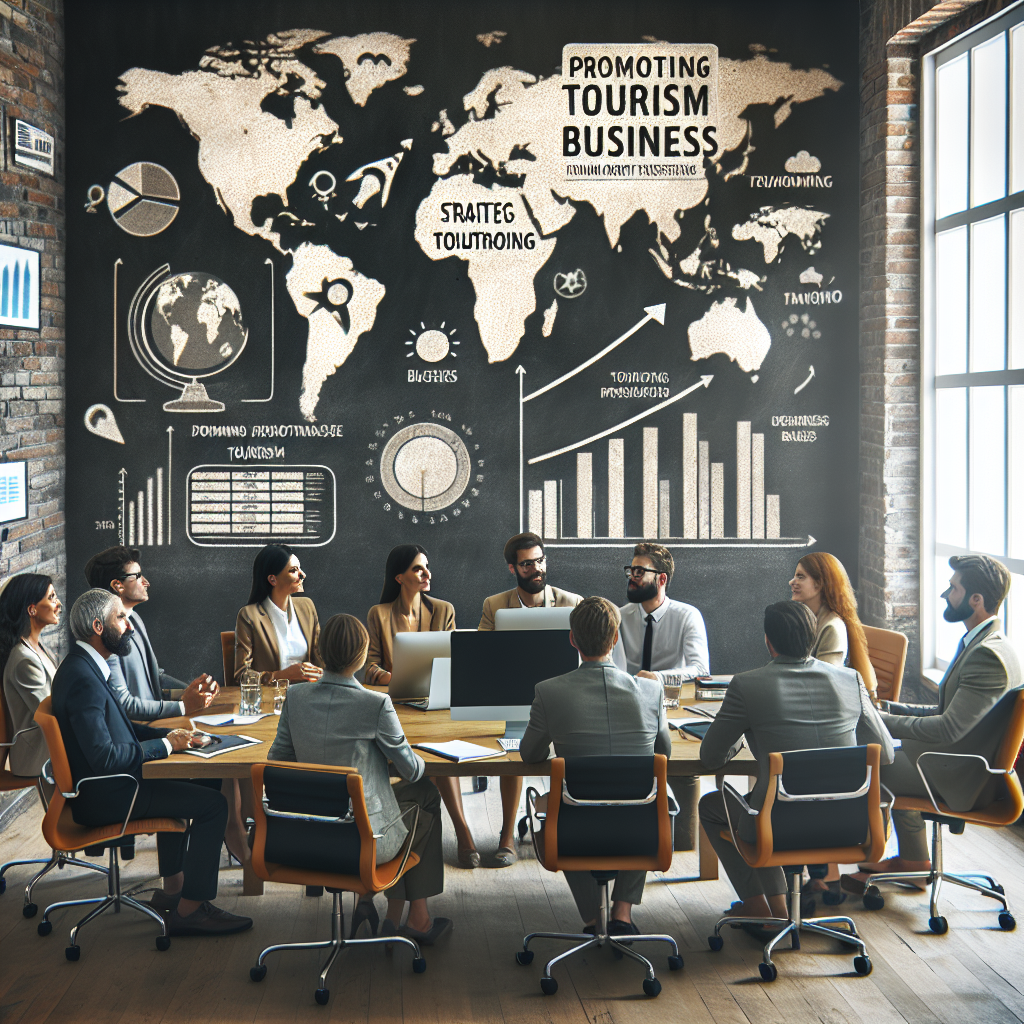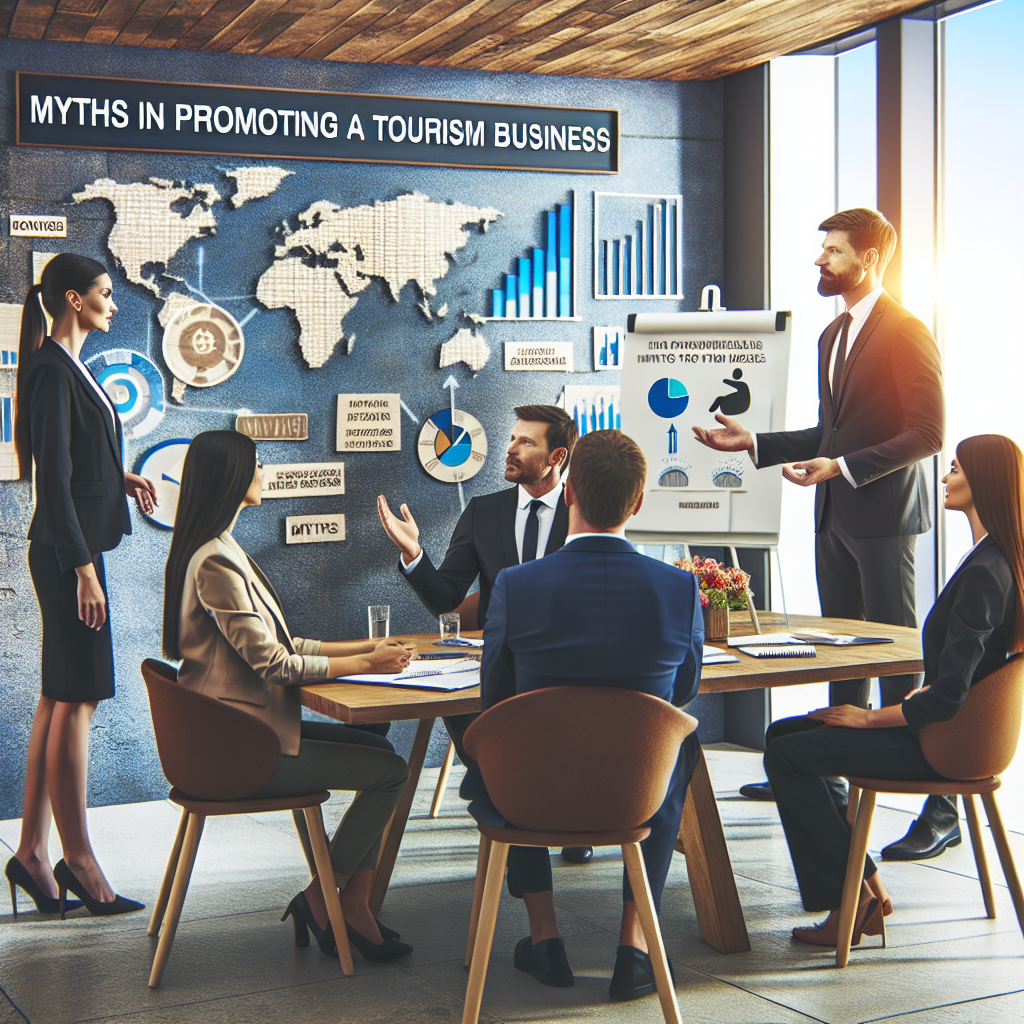Unlocking Success: Innovative Methods for Promoting Tourism Businesses in 2025

What Are the Emerging Methods of Promoting Tourism Products in 2025?

As we approach 2025, the world of tourism marketing is evolving at a rapid pace. Methods of promoting tourism products in 2025 are becoming more sophisticated, leveraging technology to connect with potential travelers in ways we never imagined. So, how can your tourism business stay ahead of the curve? Let’s explore some innovative strategies that are shaping the industry.
1. Embracing Virtual Reality (VR) and Augmented Reality (AR)
Imagine being able to take a virtual stroll through the lush forests of Costa Rica or stand in the bustling streets of Tokyo without leaving your living room. VR and AR are set to revolutionize how we promote tourism products, allowing customers to experience destinations firsthand before booking a trip. This technology is not just a gimmick; it can enhance the decision-making process for travelers. In fact, studies show that 72% of customers prefer using virtual tours when deciding on a travel destination.
2. Personalized Marketing through AI
Artificial Intelligence (AI) can gather data from past customer interactions and analyze their preferences to offer tailored experiences. For instance, if a user often browses adventure trips, AI can suggest similar journeys or even send personalized emails featuring these options! This level of customization significantly boosts engagement and can increase conversion rates by up to 30%.
3. Social Media as a Travel Planner
Social media is not just about sharing pretty pictures anymore. Platforms like Instagram, TikTok, and even Pinterest are evolving into powerful tools for how to promote a tourism business. By using user-generated content, businesses can showcase real experiences and reviews from travelers, creating trust and relatability. Did you know that 83% of travelers are influenced by social media posts when making trip decisions?
4. Influencer Collaborations
Think of influencers as modern-day travel guides. Partnering with influencers who resonate with your target audience can give your tourism products a significant marketing boost. For example, a food blogger could highlight a culinary tour in Italy, providing authentic insights and reaching followers who are passionate about food and travel.
5. Sustainability as a Selling Point
More travelers are looking for sustainable options when booking their trips. Highlighting eco-friendly practices and promoting local cultures can attract conscious travelers. Incorporating sustainability into your marketing strategy is not only beneficial for the environment but can also resonate well with a demographic that values green tourism. Recent reports indicate that 70% of travelers are willing to pay more for sustainable travel options.
6. Customer Experience Over Product
Today, it’s all about the experiences! Travelers value unique experiences over generic offerings. You can promote distinctive packages, such as culinary experiences, adventure trails, or cultural immersions that set you apart in a crowded market. This shift from product-focused to experience-focused marketing is vital in 2025.
Table: Trends in Tourism Marketing for 2025
| Trend | Description |
| VR & AR Experiences | Immersive virtual tours that enhance decision-making |
| AI Personalization | Customized travel recommendations and offers |
| Social Media Influence | Utilizing posts to inspire and inform travelers |
| Influencer Collaborations | Partnerships with influencers for authentic content |
| Sustainable Tourism | Attracting eco-conscious travelers with green practices |
| Experience Marketing | Focusing on unique experiences over standard offerings |
| Video Content | Engaging visual storytelling through video tours |
| Community Engagement | Involving locals in tourism efforts for authenticity |
| Mobile-Friendly Platforms | Optimizing services for on-the-go travelers |
| Data-Driven Decisions | Using analytics to fine-tune marketing strategies |
With over 20 years of experience in the industry, our team at Artivale.com specializes in providing full-spectrum IT services, ensuring that your tourism business stays competitive and agile in this fast-evolving landscape. Whether you need assistance with your website, SEO promotion, or social media strategies, we guarantee professional services tailored to your needs. Ready to elevate your marketing game? Contact Alexandra, our customer relations manager, at [email protected] or sign up for our services online today!
Frequently Asked Questions
- What is the importance of VR in tourism promotions?
- How can AI improve my marketing strategy?
- Why should I consider influencer marketing?
- What are sustainable tourism practices?
- How can I create unique experiences for travelers?
- What role does social media play in tourism?
- How do I optimize my website for mobile users?
- Can data analytics influence my marketing efforts?
- What is experience marketing?
- How can Artivale.com assist my tourism business?
VR enhances the customers decision-making process by allowing them to experience destinations first-hand.
AI personalizes marketing efforts based on user behavior, increasing engagement and conversion.
Influencers can provide authentic content and reach a targeted audience effectively.
Sustainable practices focus on minimizing environmental impact while supporting local economies.
By focusing on specialized packages that cater to specific interests, like culinary or adventure tours.
Social media can inspire travelers through shared experiences and recommendations from peers.
Ensure your website design is responsive and loads quickly on mobile devices to enhance user experience.
Yes, data analytics can help identify trends and target audiences more effectively.
Experience marketing focuses on creating memorable interactions rather than just selling products.
We offer various IT services, from website development to SEO optimization, tailored for tourism businesses.
How to Promote a Tourism Business: Strategies That Work in the Evolving Market

In todays fast-paced world, knowing how to promote a tourism business effectively is crucial for staying ahead. With advancements in technology and shifting consumer preferences, businesses in the tourism sector must adopt fresh approaches to reach potential travelers. Here are some dynamic strategies that can help your tourism business thrive in this evolving market.
1. Leverage the Power of Content Marketing
Creating engaging, informative content is a fantastic way to attract and retain customers. Consider starting a travel blog or a video series exploring different destinations, showcasing unique experiences, and providing useful travel tips. By offering valuable insights, you position your brand as an authority in the tourism industry. For example, a well-researched article on “Top 10 Hidden Gems in Italy” can drive significant traffic to your site, as travelers search for off-the-beaten-path experiences.
2. Optimize for Search Engines
Search Engine Optimization (SEO) is essential for enhancing your online visibility. By optimizing your website with relevant keywords such as “best tourism packages” or “affordable travel options,” you can rank higher in search results. This strategy helps potential customers find your services more easily. Reports indicate that 75% of users never scroll past the first page of search results; thus, effective SEO can significantly boost your businesss visibility.
3. Utilize Social Media Effectively
Social media platforms like Instagram, Facebook, and TikTok are crucial for modern tourism marketing. High-quality images and captivating stories can inspire travelers. For instance, a stunning photo collection of sunsets over famous landmarks can go viral, drawing attention to your travel packages. Additionally, consider running contests or giveaways to boost engagement. Studies show that 90% of people follow brands on social media, making it a prime real estate for potential customers.
4. Collaborate with Influencers
Influencer marketing can be a game-changer for tourism businesses. By partnering with travel bloggers and influencers, you gain access to their followers, who may be interested in your offerings. When they showcase your destination or service, it adds credibility to your brand. You could invite them for a complimentary trip, in exchange for honest reviews and promotions. This user-generated content can resonate more than traditional ads.
5. Focus on Local SEO
If your tourism business serves a specific location, optimizing for local search can drive traffic. Ensure your website features location-specific keywords, and don’t forget to create a Google My Business listing. This enables potential customers to find your services easily. Remember, 46% of all Google searches are looking for local information, so make sure your business is visible in those results!
6. Build Email Marketing Campaigns
Email newsletters are a potent tool for maintaining customer relationships. Share special offers, exciting news, or travel tips directly with your audience. Personalized emails with recommendations based on past interactions can lead to increased bookings. For example, if a customer previously booked a beach holiday, send them special deals on similar destinations. This targeted approach can uplift sales significantly.
7. Invest in Pay-Per-Click Advertising
Using platforms like Google Ads or social media advertising can provide immediate visibility. With the right strategy, PPC campaigns can drive targeted traffic to your website. Make sure your advertisements are tailored to your audience, showcasing enticing visuals and clear call-to-actions. A well-placed ad can capture the interest of potential travelers looking for their next adventure.
Table: Effective Strategies to Promote Your Tourism Business
| Strategy | Description |
| Content Marketing | Creating informative blogs and videos to engage travelers |
| SEO Optimization | Enhancing online visibility through targeted keywords |
| Social Media Use | Leveraging social platforms for brand visibility and engagement |
| Influencer Collaborations | Partnering with influencers for authentic promotions |
| Local SEO Focus | Making your business visible in local search results |
| Email Marketing | Maintaining customer relationships through personalized emails |
| PPC Advertising | Using paid ads for immediate targeted traffic |
At Artivale.com, we understand the intricacies of the tourism industry. With over 20 years of experience, our professional specialists can help you implement these effective marketing strategies. From website optimization to comprehensive promotional campaigns, we provide all services in one place, eliminating the need to juggle multiple suppliers.
Ready to transform your tourism business and reach new heights? Contact us at [email protected] or sign up for our services online at artivale.com. Let’s work together to make your vision a reality!
Frequently Asked Questions
- What is the importance of SEO in promoting tourism?
- How can I effectively use social media for my tourism business?
- What impact can influencer partnerships have?
- How do I measure the success of my content marketing?
- What should I include in my email marketing campaigns?
- How often should I post on social media?
- What types of content should I create?
- What budget should I set for PPC advertising?
- How can I optimize for local tourism searches?
- What’s the best way to measure ROI for my marketing efforts?
SEO increases your websites visibility, making it easier for potential customers to find your services online.
By posting engaging content and interacting with followers, you can inspire travelers and build brand loyalty.
Influencers can significantly expand your reach and add authenticity to your brand through genuine endorsements.
Tracking website traffic, engagement rates, and conversion metrics can help gauge content effectiveness.
Personalized offers, travel tips, and destination highlights are great ways to engage and retain customers through email.
Regular posting, at least several times a week, keeps your audience engaged and informed about what your business offers.
Engaging blogs, videos, and visuals that resonate with your audiences interests can attract and retain customers.
It varies by goals, but starting with a modest budget can help assess what works before scaling up.
Include location-specific keywords, create a Google My Business listing, and partner with local influencers.
Use tools like Google Analytics to track conversions and sales directly linked to your marketing campaigns.
Why Traditional Marketing Myths Are Failing in the Promotion of Tourism Products in 2025?

As the tourism landscape continues to evolve rapidly, its essential to recognize that some age-old marketing strategies and traditional beliefs are becoming less effective. In 2025, the tourism industry faces a critical juncture where the same tactics that once worked are now failing to resonate with today’s travelers. Let’s explore the reasons why these traditional marketing myths are outdated and what you can do to adapt.
1. Myth: A One-Size-Fits-All Approach Works
One of the biggest misconceptions in traditional tourism marketing is the belief that a single strategy can appeal to everyone. Today’s travelers are seeking personalized experiences that cater to their unique preferences. For example, Gen Z values authentic, sustainable travel experiences, while older generations may prioritize comfort and convenience. A cookie-cutter approach to marketing no longer cuts it. Instead, businesses need to segment their audience and target them with tailored messages that resonate on a personal level. Reports indicate that personalized marketing can deliver up to 10 times the return on investment!
2. Myth: Advertising is Enough
In the past, simply running ads in travel magazines or on billboards was often deemed sufficient to attract tourists. However, in today’s digital landscape, consumers are inundated with information, making them selective about the content they engage with. Traditional advertising is losing its punch, as savvy travelers now rely on reviews, social media, and influencer recommendations before making decisions. A recent survey found that 88% of consumers trust online reviews just as much as personal recommendations, thus emphasizing the importance of building a strong online reputation rather than just pushing advertisements.
3. Myth: Engaging Customers is Optional
For many traditional marketers, the goal was simply to provide information and close the sale. But in 2025, the most successful tourism businesses recognize that customer engagement is essential. Engaging your audience through social media, email newsletters, and interactive content fosters loyalty and encourages repeat business. Consider a scenario where a travel agency shares captivating stories from recent travelers or responds to comments on social media — such genuine interaction builds community and trust. Customers who feel connected to your brand are more likely to choose your services over competitors.
4. Myth: Maximal Exposure Equals Success
Many marketing teams believe that being everywhere at once is the key to success. However, this strategy often leads to diluted messaging and confused customers. Instead of trying to dominate every platform, determine where your target audience spends their time and focus your efforts there. For example, TikTok may be perfect for reaching a younger audience, while Facebook might be better for connecting with families. This kind of strategic targeting can lead to better engagement and conversion rates.
5. Myth: Customers Are Only Driven by Price
While competitive pricing is important, it’s no longer the sole factor driving consumer decisions. Today’s travelers prioritize experience and value over price alone. They want to know how their journey will enrich their lives, from the unique local cultures they’ll encounter to the stories they can share. Brands that can convey value through storytelling and elevate the travel experience will stand out. For example, instead of merely advertising a travel package, a company might share testimonials of individuals who experienced life-changing adventures on that trip.
6. Myth: Digital Marketing is Just a Fad
There is a belief among some traditional marketers that digital marketing is temporary and will eventually be overshadowed by other methods. However, the reality is that digital marketing is here to stay and will continue to grow. With more than 4.6 billion global internet users, establishing a strong digital presence is crucial for any tourism business. By refinancing your marketing strategies to focus on online channels and mobile-friendly content, you can reach a broader audience and stay relevant in this competitive market.
Table: Common Marketing Myths vs. Realities in Tourism
| Myth | Reality |
| One-size-fits-all marketing works | Personalization is key to engagement |
| Advertising is sufficient | Online reputation and reviews matter more |
| Engagement is optional | Customer interaction is essential for loyalty |
| Maximal exposure equals success | Strategic targeting yields better results |
| Price is the main driver | Experience and value are critical |
| Digital marketing is temporary | Digital strategies are crucial for success |
At Artivale.com, we understand the challenges tourism businesses face in today’s ever-changing market. With over 20 years of experience and a full spectrum of IT services, our professional specialists are equipped to help you navigate this complex landscape. Whether it’s enhancing your online presence or implementing data-driven strategies, we have the tools to elevate your tourism business.
Ready to rethink your marketing strategy and embrace new strategies that work? Contact us at [email protected] or sign up for our services online at artivale.com. Let’s transform your approach to promoting tourism products and achieve lasting success!
Frequently Asked Questions
- Why should I focus on personalization in marketing?
- How can I improve my online reputation?
- What is the importance of customer engagement?
- How do I choose the right marketing channels?
- What drives consumer decisions beyond price?
- Is digital marketing really a long-term strategy?
- How often should I engage with my audience on social media?
- What kind of content should I produce?
- Why is it important to focus my marketing efforts?
- Can I really change my marketing strategy now?
Personalized marketing resonates better with customers and can lead to significantly higher returns on investment.
Engaging with customers through social media and encouraging reviews can help build a positive online reputation.
Engaged customers are more likely to return and recommend your services to others, increasing overall loyalty.
Research where your target audience spends their time online, and focus your efforts on those channels.
Customers now prioritize unique experiences, storytelling, and the value propositions of travel services.
Yes, digital marketing is essential for reaching today’s audience and is not a passing trend.
Regular, consistent engagement helps build relationships and keeps your brand top of mind.
Focus on authentic stories, testimonials, and visually appealing content that highlights unique experiences.
Targeted marketing is far more effective than trying to reach everyone on every platform.
Absolutely! It’s never too late to adapt and improve your marketing strategies to meet current trends.
Submit your details in the form and our team will personally get in touch with you within the next business day to discuss your needs
